
Diaconía is an organization that currently serves as our local partner in Paraguay. Together, we seek to empower women to flourish in all areas of life – economically, relationally and spiritually. Antonia joined one of Diaconía’s very first trust groups more than 12 years ago with a friend in her community. At the time, she had only one small table top sewing machine and was making jackets to sell at a local market.
She took out her first loan for approximately $60, sold her small machine, and bought a larger industrial sewing machine. Five years later, Antonia began working with a chain of supermarkets in Paraguay providing clothing to sell in their store locations. Over the years, she has made several different clothing items for the store. Currently, she is dedicated to making pajamas and nightgowns.
Antonia also makes scrubs for medical professionals. While visiting Diaconía, one medical student asked her to make him personalized scrubs for his upcoming residency.
“I’m so excited that my product was taken to another country thanks to the opportunity that Diaconía gave me,” Antonia commented. “I always tell the other women in my group to persevere in what they start because that’s how we get ahead and it’s a beautiful thing. I may not have a big workshop, but I dream with my eyes open!”

With the help of a micro-loan, Antonia has already fulfilled so many of her dreams. She expanded her sewing workshop, put her son through university and built a small roofed area off of her house where she can provide meals for the children in her neighborhood despite her own needs. Through Diaconía’s chaplaincy program, Antonia also had the opportunity to hear about the love of God and be mentored and encouraged one-on-one and in a group setting.
Antonia’s generosity has inspired a pay-it-forward movement in her community, in the Diaconía team, and, we hope, in the lives of each one of our readers and friends all over the world.
It’s amazing the change we can make in the lives around us when we take on a spirit of gratitude and turn it into outward generosity. We continue to thank God for our incredible team, the health and protection He grants us every day and the humbling work He has entrusted to us.


Anastasia, 75, is a housewife in Concepción, Paraguay who lives from monthly government pensions. She dreamed of saving money to purchase a large rustic table to both feed her family and provide meals for the low-income children in her community.
Early this year, Anastasia heard about the opportunity to join a Savings Group in her church. In these groups, communities learn how to save and manage their money as well as how to borrow and lend money from one another.
“I was excited about this because I had never dreamed of having my own savings before in my life,” she said.
While her monthly government pensions were not much, she set aside a little each month to contribute to the Savings Group. Even when her pension payments did not come in time, Anastasia showed her commitment to the group by selling a few of her chickens so that she was still able to contribute and keep saving.
One month ago, Anastasia’s group completed their first savings cycle, and she was able to achieve her goal with the money she saved. She bought the table of her dreams!
Thanks to her Savings Group, Anastasia enjoys meals with her family and shows the children in her community the love of God through the food she provides. With a joyful heart, she now encourages other people in her community to start new savings cycles, invest in themselves and their community and work hard to achieve their dreams.


Meet Miriam Segovia, a manicurist and merchant in Paraguay. For a year she has been taking out loans with Diaconia and using them to buy materials and products for her business. She is also part of a Trust Group, led by her chaplain, Miguela, where she receives encouragement and support through the ups and downs of life.
After being with Diaconia for only a few months, Miriam was confronted with an alarming setback. She started to feel immense pain in her heel.
“I asked my daughter to check it . . . we were surprised to discover that I had a glass stuck in my foot,” Miriam said.
They went to the hospital but the situation quickly took a turn for the worse. The infection spread and her foot refused to heal, forcing Miriam to stay in the hospital for over a month. One day, she thought of her chaplain Miguela and decided to reach out to her. Miguela came right away to visit along with a group of other chaplains who took time to pray for Miriam.
“When I was discharged, the doctors forbade me to walk to prevent the wound getting worse,” Miriam said. “So the chaplains filled out an application and I received a wheelchair from Diaconia to be able to move around.”
When Miguela’s church heard about Miriam’s condition, they began to pray for her and the pastor paid her a visit. Sometime later, and to many people’s astonishment, the wound began to miraculously heal! The doctors were shocked because the only solution had been to amputate her foot. After eight months, Miriam was able to wear shoes again.
Miriam’s healing has brought immense joy to her life! This joy has not only rippled out and touched the lives of her family, but has given her a beautiful story to share with everyone she meets. Her experience serves as a profound reminder of the deep need we have for our communities to surround us and support us in our moment of weakness.

Miguela is one of the incredible chaplains that volunteers with Diaconía, GAiN’s partner organization in Paraguay. The chaplaincy program is designed to provide spiritual support and leadership to female clients who are enrolled in Diaconia’s microfinancing program. By meeting with these clients in both a Trust Group and one-on-one setting, Miguela encourages them that they are loved.
However, her journey as a chaplain hasn’t always been easy.
“When I became a chaplain at Diaconía, I was going through very painful processes in my personal life,” Miguela explained. “My marriage was struggling and my mother had recently passed away.”
Despite these personal hardships, Miguela still wanted to serve the women of Diaconía and walk alongside them as a source of mentorship and companionship.
“When I started going to the Trust Groups with the women, I felt a lot of empathy because they all go through different, difficult situations,” she said.
Although Miguela could emotionally connect with the women right away, she wasn’t able to engage the group on the spiritual level.
“The first group I went to was very reluctant to listen to me and, for a while, I wanted to give up…,” she shared.
Miguela’s perspective was transformed one day when she received a call from one of the group members, Miriam, who asked her to come and pray for her in person. This unexpected breakthrough in a time of disappointment and doubt served to majorly bolster Miguela’s faith.
“This filled my life with hope and once again I realized that God works even when we cannot see,” Miguela shared. “He makes a way even when all we can see is wilderness.”
Currently, there are 211 chaplains volunteering their time with Diaconía. Because of their steadfast and prayerful commitment to the women in their Trust Group, many of these women’s lives are being impacted. Miguela’s story is a powerful reminder that we will face trials and hardship, but we will never go through it alone. Even in moments of doubt, God already has an active hand in the lives of the women in Paraguay.
A summary of our Economic Empowerment fundraisers in Alberta and BC
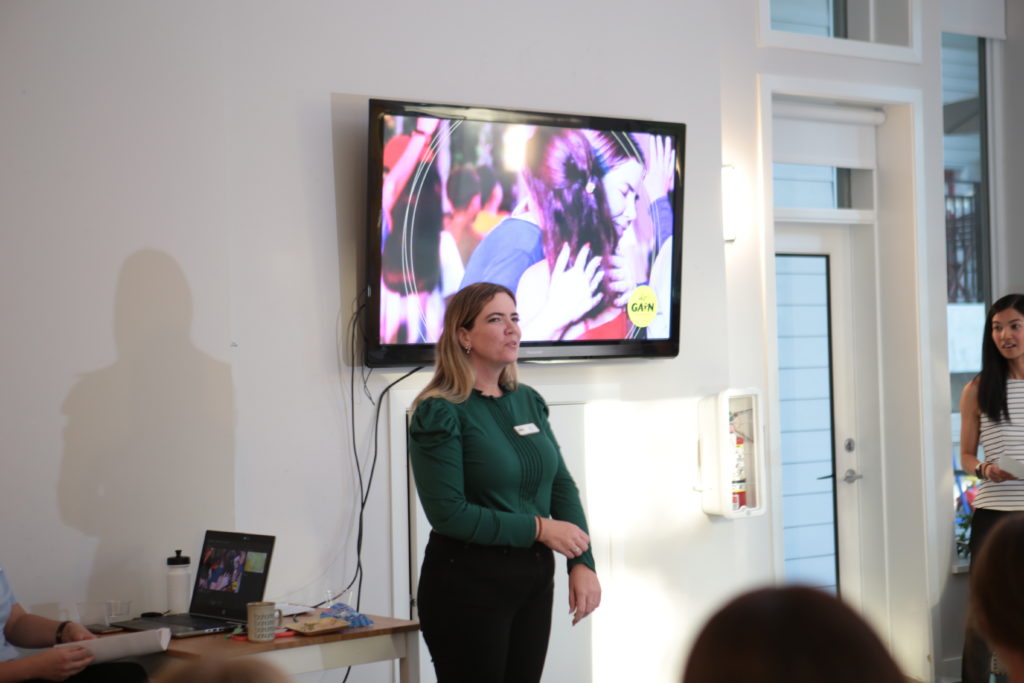
Over the past month, our GAiN team hosted several fundraising events showcasing our Economic Empowerment strategy in both Alberta and BC. Our guest speaker, Adela Braun, came from Paraguay to share at these events and give first-hand insight to the transformative work that is going on in Paraguay through our partner, Diaconia.
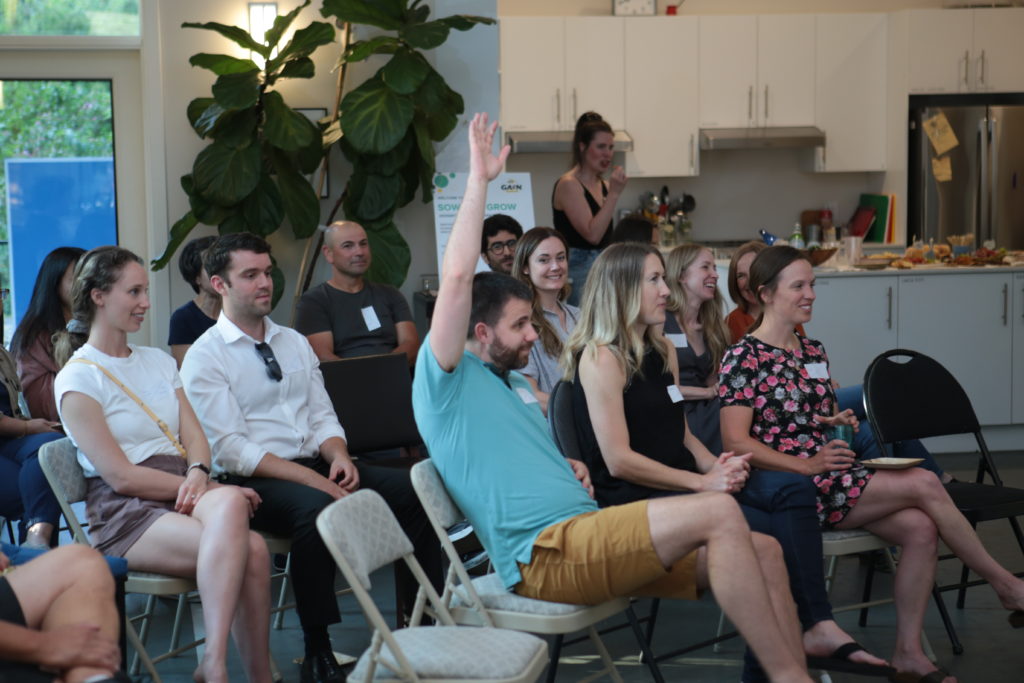
Adela and our team presented on the mission of GAiN’s Economic Empowerment in several unique settings, including a charcuterie evening, craft evening, breakfast and dessert fundraiser, and a yacht cruise. The people that attended each event were full of warmth and curiosity and asked many insightful questions.
Every event included an overview of who GAiN is and our mission, an interactive activity to help people better understand the concept of microfinance, an interview with Adela to hear a few stories as well as time for a local guest speaker to share about their experience as an entrepreneur.
One of the attendees shared, “The activity (game with the boards) at the beginning was really good. Most understand microlending but the game made it more visual and the perfect relaxed way to start the night.“
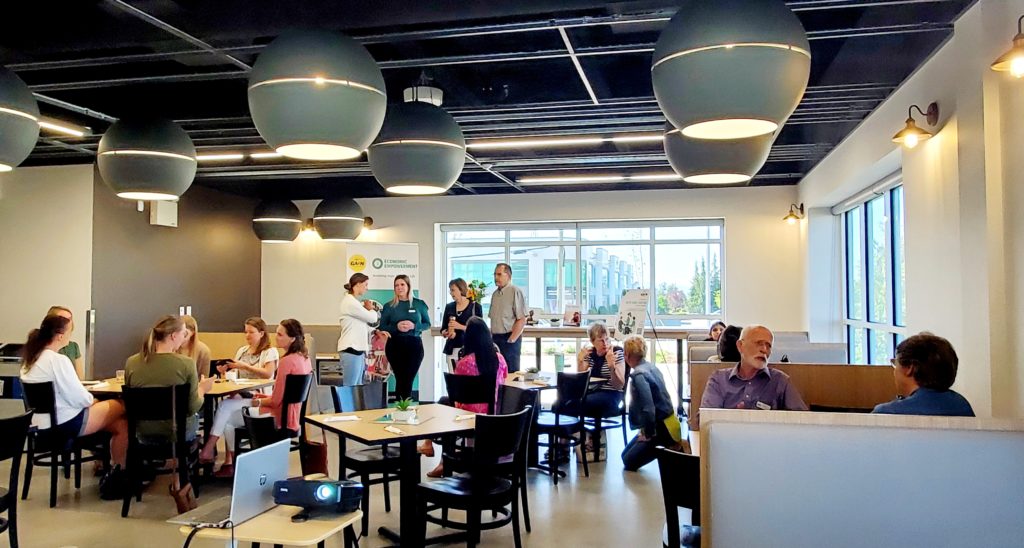
Monique Lieuwen, Program Manager of GAiN’s Water for Life Initiative and one of the coordinators of the events commented, “The events were so encouraging and incredible to be a part of! It was exciting to have new audiences come and hear about the ministry.”
Our team is full of anticipation for the direction that God is leading GAiN. We are hopeful that through the awareness and support raised by these fundraisers, the mission to empower women living in generational poverty will continue to expand and grow.
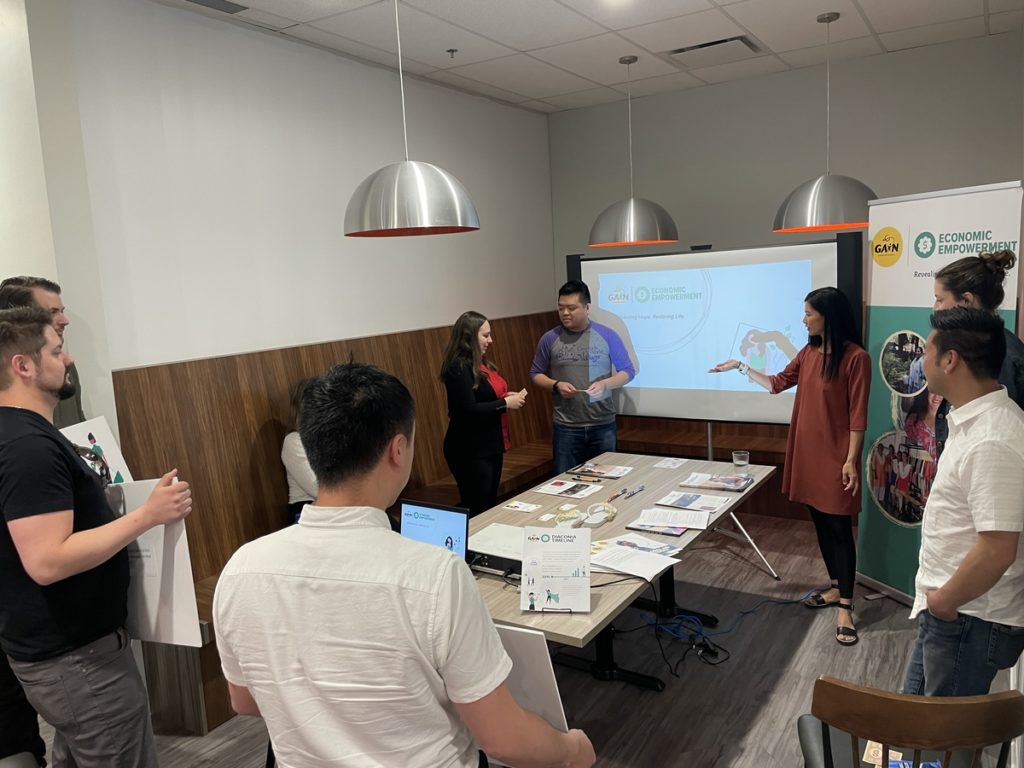
Two women’s stories of hope in Paraguay –
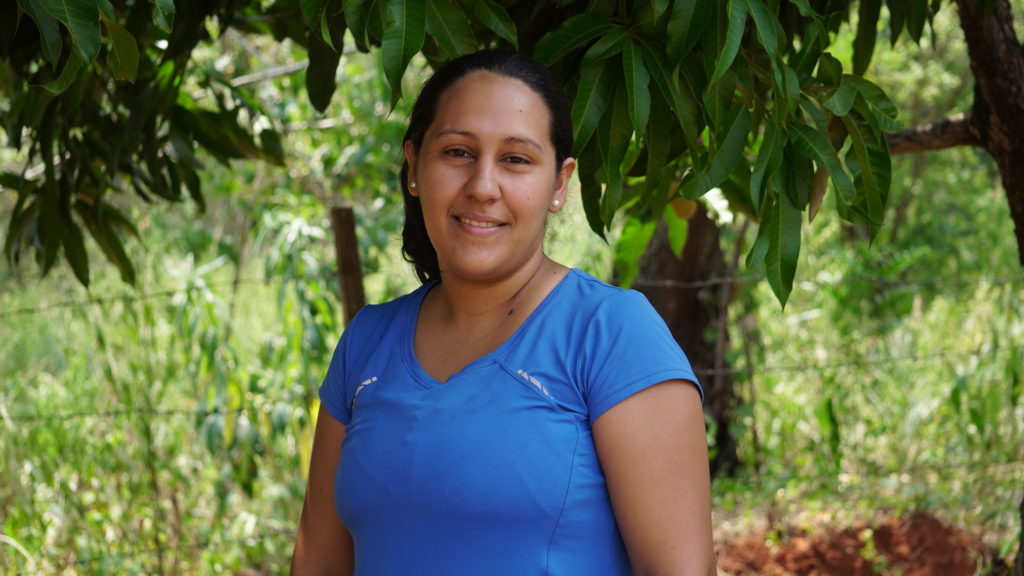
Through Diaconia, Global Aid Network (GAiN)’s partner in Paraguay, women are being equipped to overcome poverty and make a way for themselves in the world. With the help of microloans, small businesses are strengthened and given the chance to grow, while the formation of trust groups cultivates a sense of support and community amongst other women entrepreneurs.
During our team’s most recent visit to the field, we witnessed how Diaconia experienced challenges during the pandemic, yet found new methods of maintaining solid connection with clients. One way was through increasing the use of mobile technology, which yielded positive results. Gloria, who leads the chaplaincy program, said she was able to have more genuine conversations through WhatsApp because it provided a more personal and private channel to talk through struggles with women in trust groups. Since Paraguayan culture is shy and low profile, WhatsApp served as a natural and comfortable way for these women to share openly and have honest conversations about faith and life. Now that they are back to in-person meetings, chaplains reported that there is a new level of closeness with clients that they haven’t felt before.
During the pandemic, the ministry used video instructions to teach women and encouraged them to send pictures of their end product to qualify for a gift. Although many people tuned in for virtual training, the ministry recognizes that in-person training had higher engagement and are planning on returning to this system as soon as possible. Diaconia also plans to launch a new program that delivers vocational training to prisons, in partnership with Trans World Radio. Women who are incarcerated would learn basic crafting skills and, through another local charity, would sell their work and be able to receive a small income through their products. Through this initiative, the ministry hopes to further extend the opportunity for economic empowerment to those living on the margins of society.
While in Paraguay, our team encountered a young woman named Gilda who had experienced the fruitful benefits of partnering with Diaconia. When Gilda was only 18 years old, she worked with her mom and another woman selling food. Once she heard about the microloans that were available through Diaconía, she knew this could help bridge the gap between her and her mom’s current work life and their dream of having an independent business.
Both Gilda and her mother joined one of the very first Diaconía trust groups, which provided a foundation of support and encouragement for their business journey. Ten years later, their business has expanded and they now sell clothing as well. With her last loan, Gilda purchased a vehicle that allows her to travel and buy clothing in bulk to resell in her neighborhood. Her trust group has also grown, and now her mother, husband, and three of her cousins are all receiving loans from Diaconía for their small businesses.
“With each loan, I invest in my business. And when our loan cycle is over, I use the savings I get back to invest in my house, making it a dignified home for my family,” she said.
Gilda dreams of building a small clothing shop and being able to send her children to college so that they can become professionals and not have to struggle every day to provide for their future families. She is thankful for the help she has received through Diaconía and the economic empowerment that all of the women in her family and community can now experience thanks to the ministry’s ongoing support.
“The culture naturally tells women that they cannot do certain things, they are supposed to have more hardships, they are not supposed to have dreams and they have no hope, and they are useless, but this is not true at all. These programs help women gain confidence, and see their value in Christ … they can celebrate who they are.” -Citialli, local Paraguayan woman
We also met a woman named Ilda and her husband Carlos, who came from a humble community in central Paraguay. In search of a better future for themselves and their family, Ilda and Carlos, along with their two kids, packed up their belongings and settled to the outskirts of the capital city, Asuncion.
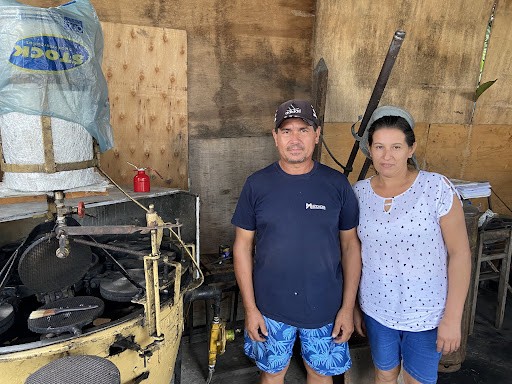
With little money and securities, Ilda and Carlos had to be wise with their resources. They used their old truck to drive themselves into the city, and started a business selling general goods which ranged from clothing and plastic buckets to consumables, like soap and snacks. Soon, the hard reality of starting a new business set in, as competition was fierce and they weren’t able to get any traction.
Knowing their livelihoods were at stake, Ilda and Carlos brainstormed what else they could do to support their family. They landed on the idea of selling charcoal because it is commonly used by people to cook and heat up their homes. Though the couple started to buy charcoal from the countryside and resell it in the city for a profit, challenges continued to appear. Their truck began to have frequent breakdowns, forcing them to pay for repairs and lose money with the business.
In the meantime, Ilda heard from one of her friends about Diaconia, where she could access micro-loans. At first, she was a bit skeptical about the organization, but the reality that she would be accessing the loans with other people gave her more confidence. She decided to apply and join a trust group, which allowed her to keep her charcoal business alive and give her family stable income.
After a few loan cycles, Ilda had not only repaid her loans, but her business had expanded to the point where she was able to purchase an additional truck to transfer more products from the countryside to the city. As the business gained momentum, Carlos was able to make agreements to sell their products to 10 gas stations and some smaller independent stores, further stabilizing the revenue of their business.
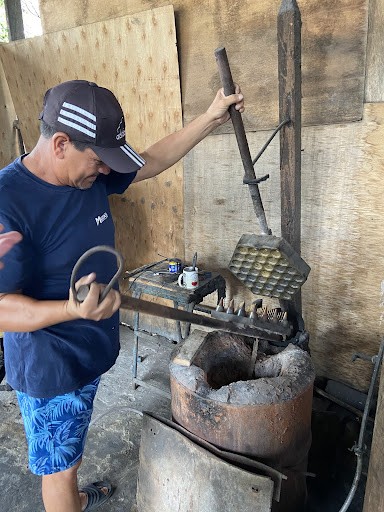
Raising kids while making sure there was enough money for food and school was a difficult task for Ilda and Carlos. Yet they persevered in order to provide a better life for their children. “What other options do we have? I only have grade 5 education,” Ilda said. “And I want to make sure my children have enough opportunities for the future.”
Their oldest daughter, who turns 15 this year, dreams of becoming either a journalist or a lawyer, while their oldest son, who is 16, has already started training to become an electrical mechanic for cars. “And now, the entire family helps out! Our kids would also help and I would give them some allowance for their work,” Ilda said.
As the business grew, Ilda and Carlos hired two more people to sort and repackage the charcoal, and added more space and equipment to make working more efficient. Ilda also noted that the demand for charcoal dips in the summer months, so they put some of their money toward starting an ice cream cone business! This decision allows them to have consistent income throughout the year.
Ilda loves being a part of the savings group called “Progresso de Jesus-2” (Progressing with Jesus-2). “It’s not just about the money, but people in the group respect each other and look out for one another.” When asked about her faith she said “being Catholic myself, the devotionals by the chaplains really helps me to understand Jesus and how I should love one another.”
By partnering with Diaconia, women like Ilda and Gilda are given the opportunity to watch the seeds of their business grow into something stable and strong. Currently, there are 5,893 Diaconia clients, and we are excited to continue sharing their stories of hope.
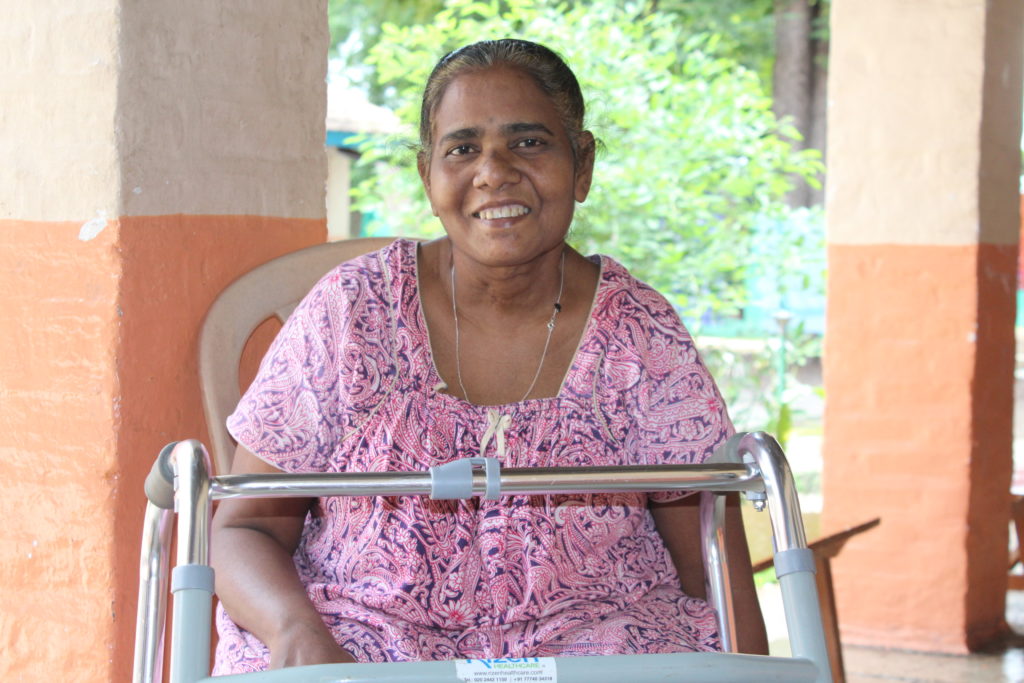
Story from Pandita Ramabai Mukti Mission
Enthusiastic, hardworking and up with the lark, every single day! That’s Naomi Wetering in a nutshell. The task of preparing the first meal of the day in the kitchen for the residents of Mukti was Naomi’s responsibility, which she did joyfully… until she contracted COVID-19 in the last week of April.
Initially, she was admitted to Mukti’s hospital, but when specialized treatment was required, she was transferred to SDA Hospital in Pune. Naomi was treated for COVID and subsequently, her test report came negative, but she was diagnosed with lung fibrosis and thyroid. From SDA, she had to be transferred to Divekar Hospital in Varvand. There seemed to be no improvement and her health was deteriorating rapidly. Later, she was moved to Sassoon Hospital in Pune.
Doctors in all of the hospitals she was treated in had given up hope and said it was only a matter of time before the inevitable happened. Naomi was not responding to treatment and the situation appeared very bleak. Naomi herself was weak and looked like she had given up the fight. The BiPap machine started being used for her, right from the time she was hospitalized outside. Afterward, she was brought back to the Mission hospital.
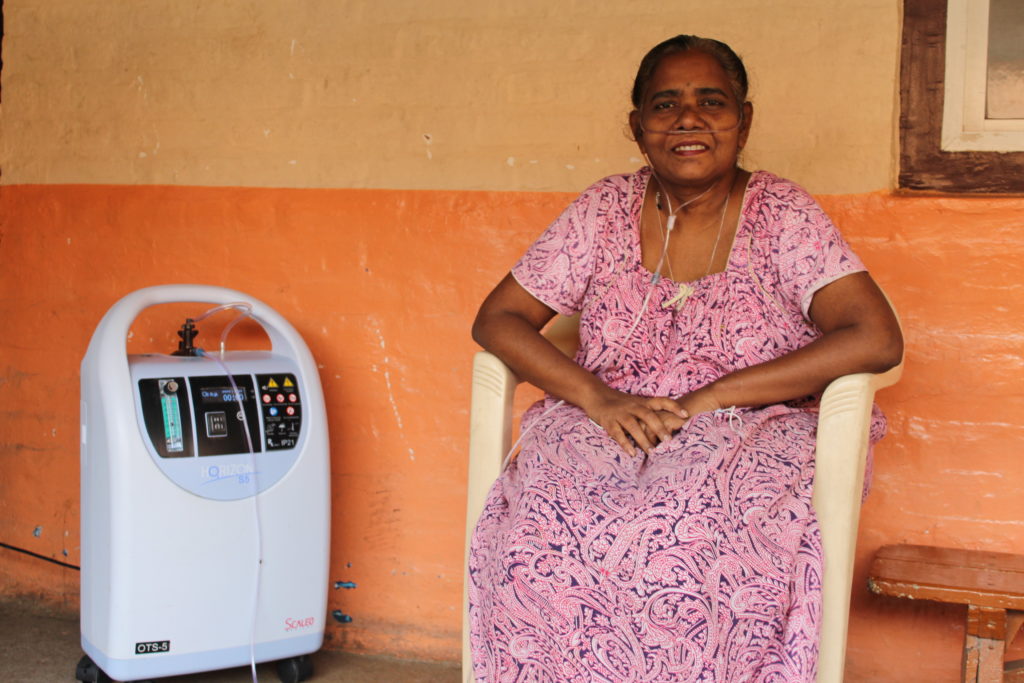
Gradually, Naomi started gaining strength. The hospital used the oxygen concentrator for her, initially putting her on eight litres of oxygen per minute. Within ten days, it came down to two litres per minute. Now, she is able to breathe on her own and oxygen is supplied only when she feels tired. Dr. Ajita Kuberji, Mukti’s medical officer, says, “When I see Naomi walking in the hospital, I see God’s grace and His healing touch.”
Indeed, Naomi’s recovery and progress are no less than a miracle. Her own faith has increased tremendously and she is grateful for her healing and the new life that she has received from Almighty God. She is on a special diet, and does prescribed exercises and physiotherapy. She wants to recover completely and regain her former health and strength.
Naomi can’t wait to get back to the kitchen and resume preparing breakfast. The residents at Mukti already miss the breakfast that she used to make and look forward to her coming back. She is happy, steadily progressing and well looked after in the hospital, but she misses her regular routine, residence and her friends.
We are so grateful to our supporters for partnering with us to help reveal hope and restore life to residents and staff of Mukti Mission. Your generosity and willingness to act urgently has ensured that patients at Mukti, like Naomi, were able to get life-saving care at Mukti’s own hospital.
Mukti is happy to share that on July 21, 2021, Naomi was able to celebrate her 41st birthday in the hospital!
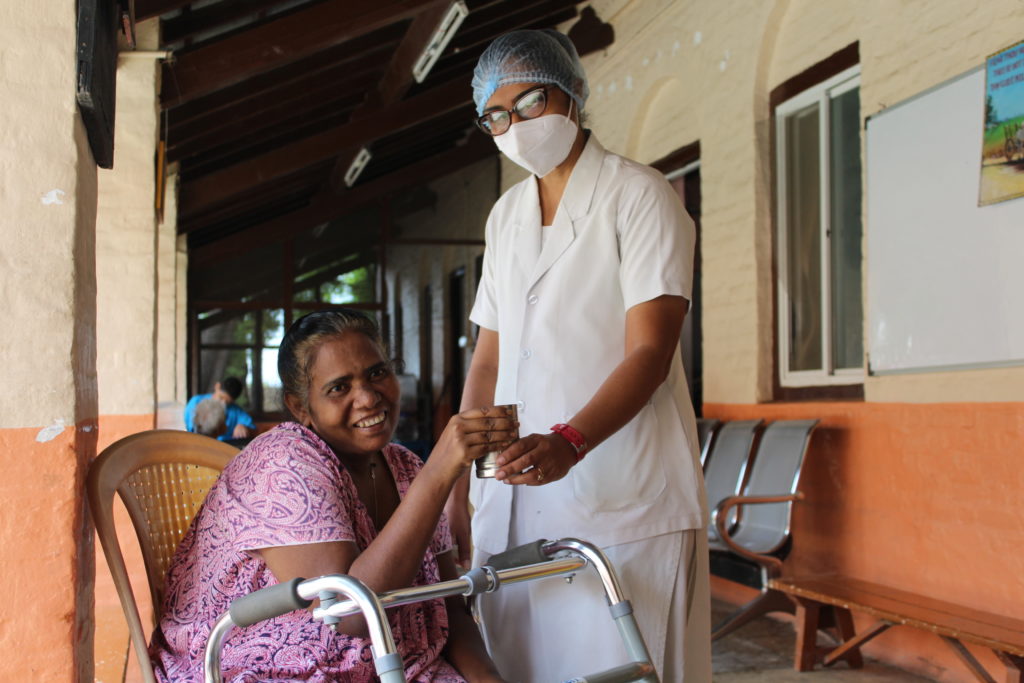
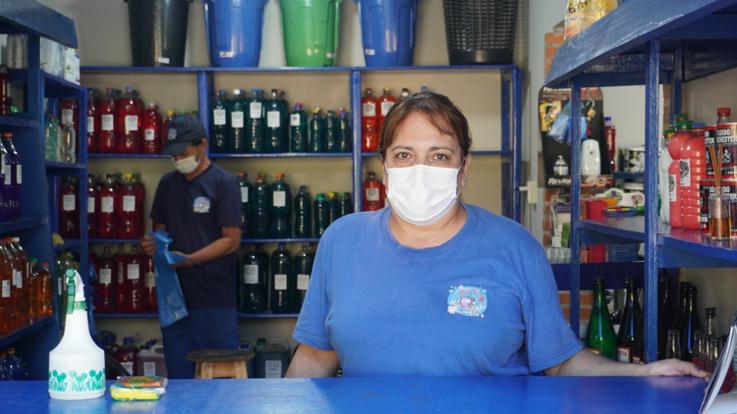
For nearly two decades, Rosa has fought to break stereotypes to run a growing business in Paraguay. What began as a garage start-up project selling wash rags is now a cleaning supply business that employs several people, and contributes to several other businesses in the area.
Through Diaconia, Global Aid Network (GAiN)’s partner in Paraguay, Rosa has been able to receive micro-loans to grow her business. The micro-finance project is part of GAiN’s Economic Empowerment core strategy, which aims to alleviate poverty, unemployment and a lack of economic opportunities.
When Rosa joined her Diaconia trust group, eight years ago, she met several other women entrepreneurs who have supported one another as they dream about growing their businesses and work on making their dreams become a reality. Rosa is thankful for her trust group and has been grateful for the support she received. “It’s not common to trust women and help them build a business, but Diaconía gave me that opportunity,” she said. Rosa formed her own group and continues to invite more women so that they can have more opportunities to improve their quality of life.
Despite the difficult situations that Rosa has confronted along her journey of running a business, she keeps her faith in God and her mindset positive. “I am a warrior. I will get through this,” she said with confidence. Even through the economic crisis caused by the COVID-19 pandemic, Rosa’s business stood firm and even helped others in her community. When she heard that recyclers were struggling to feed their families due to lack of work, she told them that she would buy all the plastic bottles they could bring her to sell her cleaning products in. Because of Rosa and her business, several people were able to provide for their families and survive the pandemic.
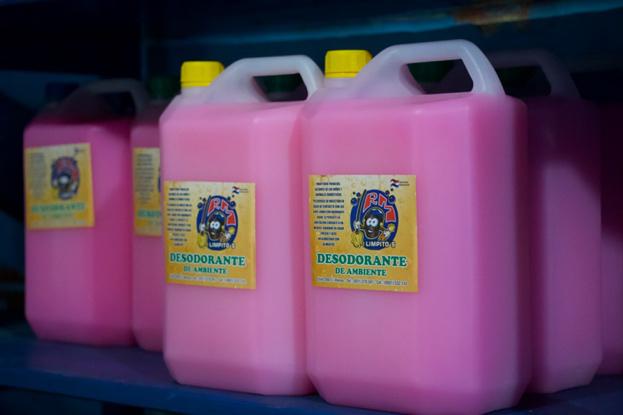
As Rosa gets older, she dreams of one day selling her business and being able to retire with that income. Thanks to the stability of her income through her cleaning supply business, her children were able to study, become professionals, and now all live on their own – opening the door for Rosa to retire and enjoy her family.
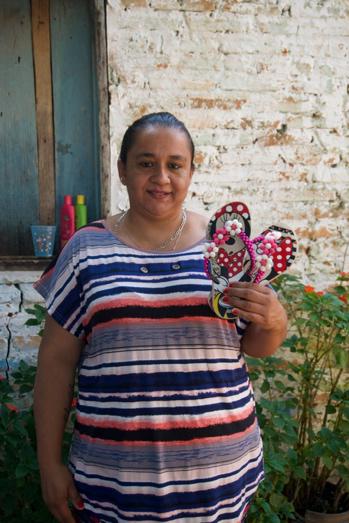
Fabiana had to leave her two children at home while she went to work. When she became pregnant with her third, she knew it was time for a change. It was five years ago when she accepted her sister-in-law’s invitation to form part of a trust group and start her own business with the help of Diaconia, Global Aid Network (GAiN)’s partner in Paraguay. Diaconia’s micro-finance project is part of our Economic Empowerment core strategy, which helps empower women entrepreneurs, providing them with resources to start their own businesses and other income generating activities.
Now, Fabiana is selling clothes in her neighborhood, and can stay home with her three children and niece that she adopted. The women in the trust group have provided Fabiana with the support she needed to build and grow her business. It was truly the first time that she learned what it was like to do life in community.
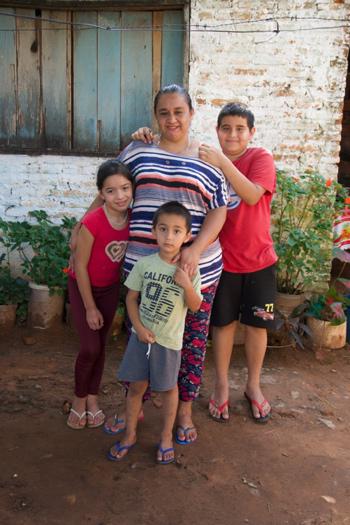
Last year, Fabiana experienced a health scare. She had several expensive tests done on her heart and the medications she needed to take exceeded her financial capabilities. Her group came together to support her and held several fundraisers to pay for Fabiana’s medical expenses and help her make her loan payment. Thanks to the solidarity of her trust group, Fabiana’s health continues to improve and her family never lacked anything.
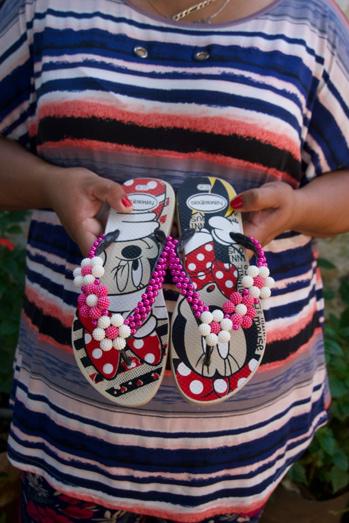
Her group, called “Women, Goals, and Achievements,” also requested and completed one of Diaconía’s vocational training courses: sandal decoration. Only two weeks after finishing the course, Fabiana sold eight pairs of sandals and was grateful for the additional income generated.
Thanks to the influence of her group’s chaplain, Fabiana also received spiritual and emotional support through her health problems and has started attending a local church with her family. She has learned to value every day while still dreaming for a better future for her family. “I want to remodel and improve my home,” she commented. As Fabiana works to grow her business, she dreams of a safer, nicer home for her family, and of giving her children the best in life.
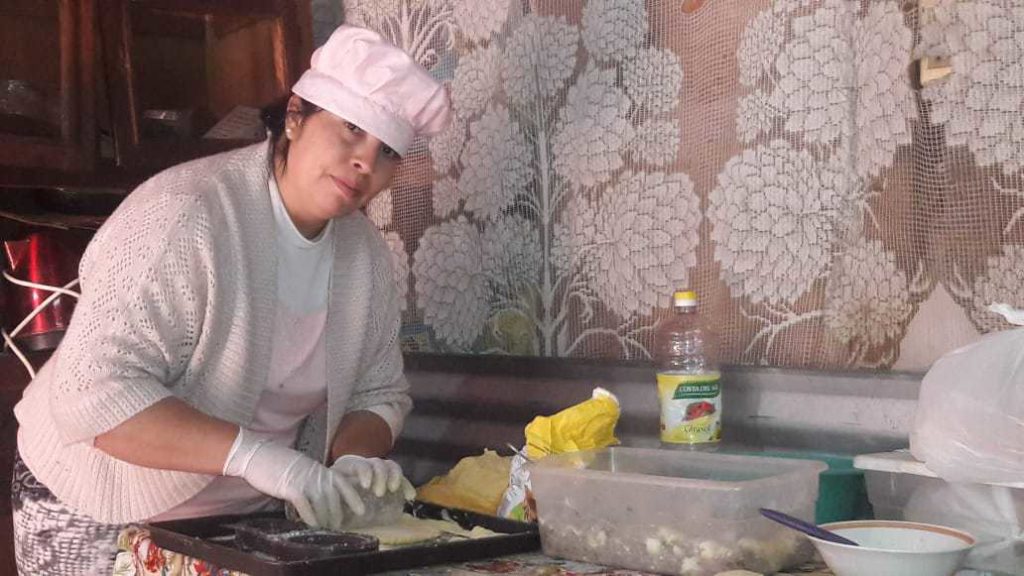
In 2013, Alice was working at a clothing store when she got pregnant with her third daughter. She quickly realized that working away from home was no longer an option for her, with her husband also working as an electrician.
It was her sister-in-law who introduced Alice to Diaconia, Global Aid Network (GAiN)’s partner in Paraguay. Through Diaconia, Alice’s sister-in-law was able to borrow a microloan to start and grow her own business. It was through the trust group that she was able to get connected to a group of other entrepreneurs and a chaplain – helping them grow, not just as business owners, but also in their faith. When Alice was invited to join a Diaconia trust group, she decided to take the risk and try something new.
With her first loan, Alice started making traditional Paraguayan foods to sell in her community. After several loan cycles, she decided to use her savings to purchase materials for event decoration. She started decorating for birthday parties, baby showers, and quinceñera parties. Alice has now been with Diaconía for seven years and has a small food stand on the main road, a few blocks from her home.
When the COVID-19 pandemic hit and Paraguay enforced strict lockdowns, she stayed positive and reinvented herself. During the quarantine months, she began to make fast foods in her home to sell to her neighbours, along with soft drinks.
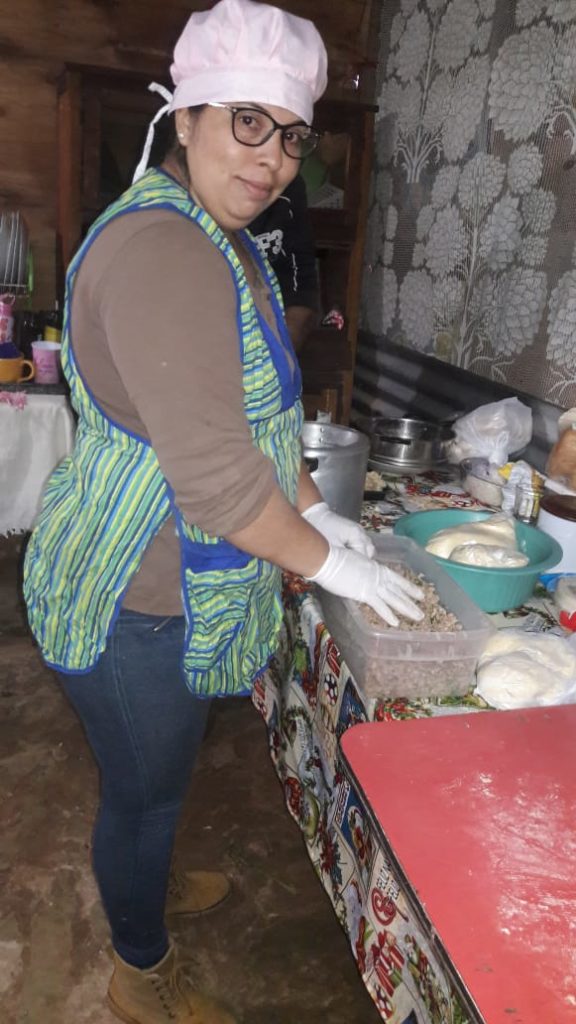
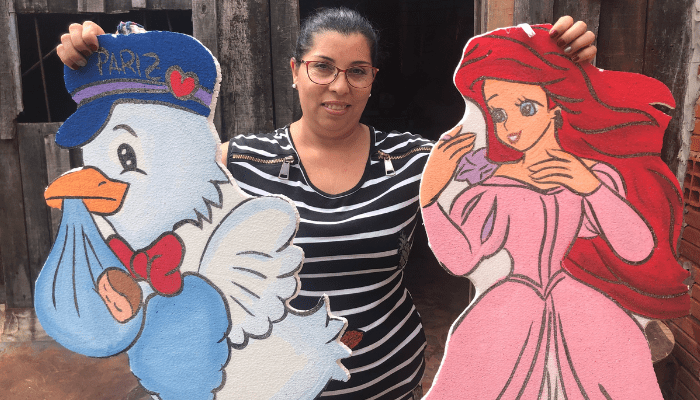
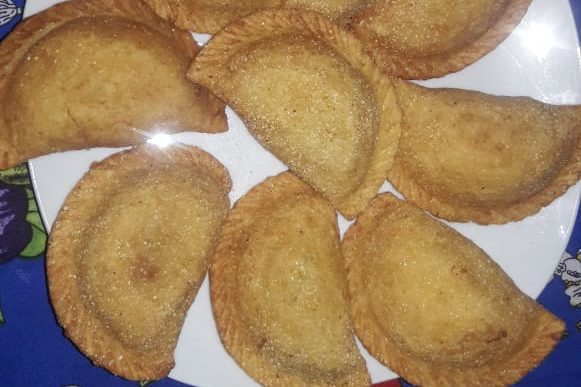
“It’s not easy. I even began to offer beauty services like hair treatment and styles, so that we could keep saving,” she said.
The Diaconia trust group that Alice belongs to is called “More than Conquerors” and has 13 women that support each other in their businesses. “When someone is struggling, we all come together and divide up their payment. Then when that person can, she pays us back. But we always converse about it first,” she commented about her group’s solidarity. She says that good communication is the key to her group staying together for so long.
Each trust group has access to a designated chaplain who provides spiritual support, prayer and emotional support. Before each meeting, they share a Biblical devotional and offer to connect women to local churches in their area.
Alice says that their group has learned a lot from their chaplain and that her home never lacks prayer. She and her husband kneel and pray every morning before they go to work. “I thank God for everything I have and everything that he keeps giving me.”
Her greatest wish is for her daughters to keep studying. Alice worked hard to find new sources of income during the pandemic and thanks to her efforts, she was able to pay the registration fee for her daughter to start studying law at a local university in February 2021.
Alice and her husband are thankful that they had the opportunity to learn and practice saving financially, with the help of Diaconia. They are now saving to buy their daughter a laptop for college. They were also able to purchase a family vehicle that allows her husband to go to work safely, and now can take their daughter to and from school.
While Alice has already achieved so many of her dreams for her business and her family, she has one more dream for herself. She would love to finish her studies. Alice dropped out of school after ninth grade, had children and began working to help sustain her family. Now that her daughters are older and her family is stable, her dream is to finish secondary school and go on to study nursing in a local university. Because of the support she received through Diaconía, Alice’s hard work and dedication has improved her family’s quality of life and continues to give them hope for a better future.
Like Alice, many other women have been able to find financial freedom from debt, support their families, grow in their relationship with Jesus, and live out their dreams. The micro-finance project is part of our Economic Empowerment core strategy, which helps to empower women entrepreneurs and provide resources so that they can start their own income generating activities and live life to its fullest (John 10:10). It’s our hope that many more women, like Alice, will be able to grow their own businesses and accomplish more than what they could have ever imagined!
